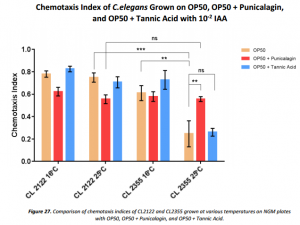
Alzheimer’s disease is the fifth leading cause of death in the United States, however we still don’t fully understand the pathology of the disease and its underlying mechanisms. This neurodegenerative disease involves neuronal death and brain atrophy associated with the presence of amyloid-β plaques, leading to impaired memory and cognitive skills, as well as the disruption of everyday tasks, such as movement and speech. We have an ongoing project where the effects of two polyphenols found in plants, punicalagin and tannic acid, were studied as they have been shown to have antioxidant and anti-inflammatory properties, implicating neuroprotective effect. C. elegans expressing amyloid-β plaques were tested for chemosensation and muscular deficits Alzheimer’s disease can cause olfactory defects and paralysis in patients. From the current results, we are able to see that the polyphenol punicalagin mitigates the behavioral defects in C. elegans caused by Aβ42 protein expression in neuronal cells. Tannic acid, unlike punicalagin, was unable to mitigate any of the behavioral effects although, previous studies have implicated tannic acid as a good candidate for Alzheimer’s disease therapeutics. This project is on going and will include things such as gender bias, dose response, combination therapies, and more intricate assays in the future.

